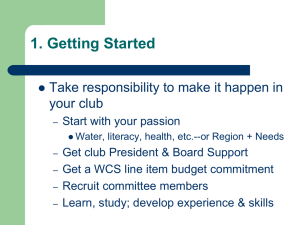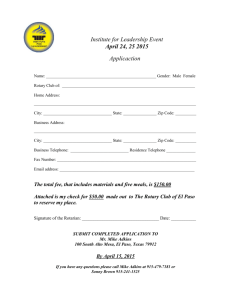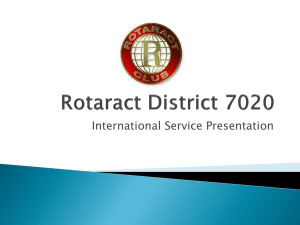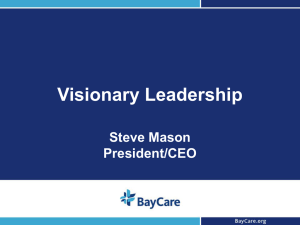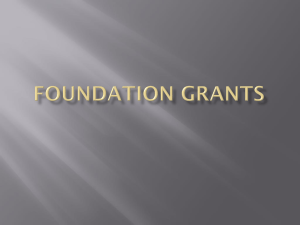Conflict of Interest Policy for Grants
advertisement
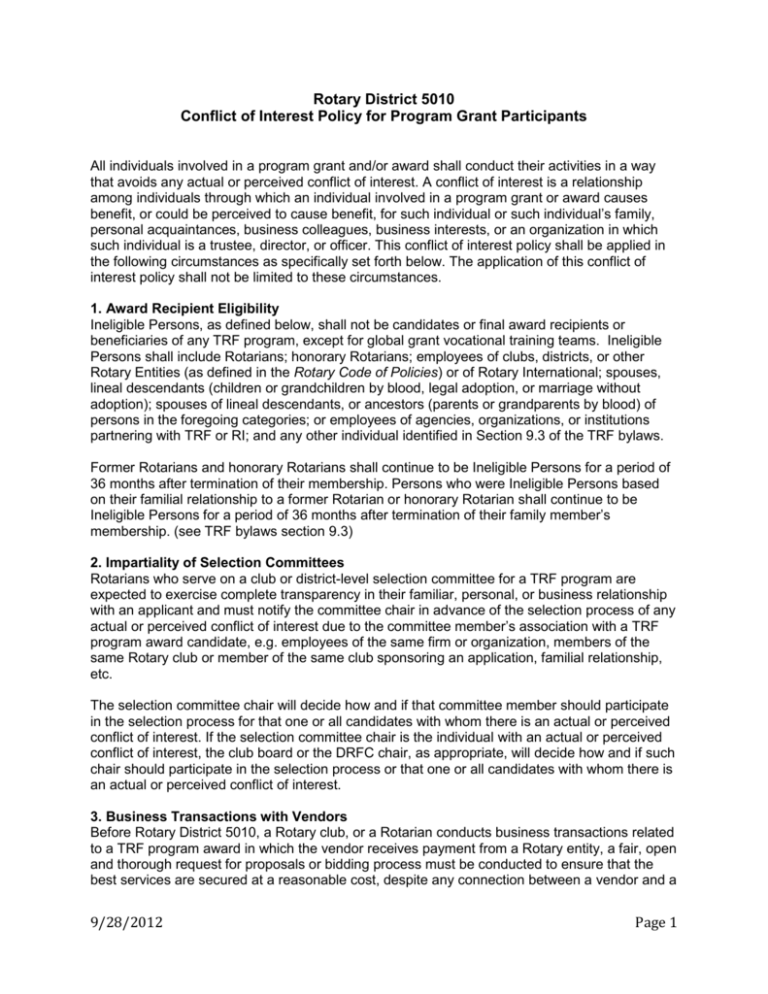
Rotary District 5010 Conflict of Interest Policy for Program Grant Participants All individuals involved in a program grant and/or award shall conduct their activities in a way that avoids any actual or perceived conflict of interest. A conflict of interest is a relationship among individuals through which an individual involved in a program grant or award causes benefit, or could be perceived to cause benefit, for such individual or such individual’s family, personal acquaintances, business colleagues, business interests, or an organization in which such individual is a trustee, director, or officer. This conflict of interest policy shall be applied in the following circumstances as specifically set forth below. The application of this conflict of interest policy shall not be limited to these circumstances. 1. Award Recipient Eligibility Ineligible Persons, as defined below, shall not be candidates or final award recipients or beneficiaries of any TRF program, except for global grant vocational training teams. Ineligible Persons shall include Rotarians; honorary Rotarians; employees of clubs, districts, or other Rotary Entities (as defined in the Rotary Code of Policies) or of Rotary International; spouses, lineal descendants (children or grandchildren by blood, legal adoption, or marriage without adoption); spouses of lineal descendants, or ancestors (parents or grandparents by blood) of persons in the foregoing categories; or employees of agencies, organizations, or institutions partnering with TRF or RI; and any other individual identified in Section 9.3 of the TRF bylaws. Former Rotarians and honorary Rotarians shall continue to be Ineligible Persons for a period of 36 months after termination of their membership. Persons who were Ineligible Persons based on their familial relationship to a former Rotarian or honorary Rotarian shall continue to be Ineligible Persons for a period of 36 months after termination of their family member’s membership. (see TRF bylaws section 9.3) 2. Impartiality of Selection Committees Rotarians who serve on a club or district-level selection committee for a TRF program are expected to exercise complete transparency in their familiar, personal, or business relationship with an applicant and must notify the committee chair in advance of the selection process of any actual or perceived conflict of interest due to the committee member’s association with a TRF program award candidate, e.g. employees of the same firm or organization, members of the same Rotary club or member of the same club sponsoring an application, familial relationship, etc. The selection committee chair will decide how and if that committee member should participate in the selection process for that one or all candidates with whom there is an actual or perceived conflict of interest. If the selection committee chair is the individual with an actual or perceived conflict of interest, the club board or the DRFC chair, as appropriate, will decide how and if such chair should participate in the selection process or that one or all candidates with whom there is an actual or perceived conflict of interest. 3. Business Transactions with Vendors Before Rotary District 5010, a Rotary club, or a Rotarian conducts business transactions related to a TRF program award in which the vendor receives payment from a Rotary entity, a fair, open and thorough request for proposals or bidding process must be conducted to ensure that the best services are secured at a reasonable cost, despite any connection between a vendor and a 9/28/2012 Page 1 Rotary entity. Possible conflicts of interest may arise when a Rotary entity is considering business in which funds will be paid to a Rotarian; a goods and/or services provider owned or managed by a Rotarian, Honorary Rotarian, employee of a club, district, or other Rotary entity or of Rotary International, Rotarian’s spouse, lineal descendants (child or grandchild by blood, legal adoption, or marriage without adoption), spouses of lineal descendants, and ancestors (parent or grandparent by blood), or employees of agencies, organizations, or institutions partnering with TRF. Examples of business relationships that may require further review to confirm that a Rotarian conflict of interest does not exist include business transactions with a partner nongovernmental organization, goods or services provider, insurance company, travel agency, shipping agency. study institution, language skills testing firm, etc. Business transactions with individuals or entities with whom there is an actual or perceived conflict of interest can be completed upon approval of the DRFC if such transaction provides the best product or service at fair market value, as evidenced by a sales quote or offer obtained through a fair, open and thorough request for proposals or bidding process. 4. Reporting Actual or Perceived Conflict of Interest Any concern about an actual or perceived conflict of interest involving a program grant or award must be reported immediately in writing by a Rotarian or Rotary entity involved to the District Rotary Foundation Ombudsman and the DRFC with a copy to the District Governor. The Ombudsman will contact the Legal Advisor, Grant Chair and the DRFC to review the matter and decide if a conflict of interest may exist for a particular case. If, upon review of the situation, it is determined that there is or has been a conflict of interest in the execution of a TRF program grant or award, the Grants Chair shall fashion an appropriate remedy. Such remedy may include the cancellation of current or suspension of future TRF program grants or awards involving a particular Rotary club or District Committee. 9/28/2012 Page 2
